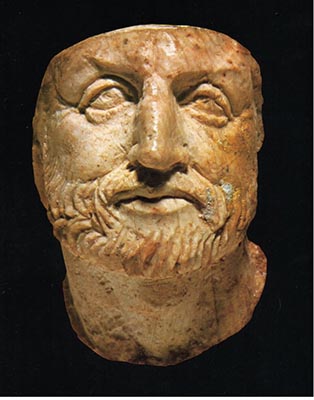Also known as:
Philippos Ii Of Macedon, Φίλιππος Β' της Μακεδονίας
More People of Greece
More Topic Categories
Related Destinations
Philip II of Macedon (382 BC - 336 BC)
 Philip II of Macedon was a King of Macedonia and turned it into a powerful state, uniting the rest of the Greek states into one. He was the one who thought of and prepared the kingdom for the campaign against the Persians, which was completed by his son, Alexander the Great.
Philip II of Macedon was a King of Macedonia and turned it into a powerful state, uniting the rest of the Greek states into one. He was the one who thought of and prepared the kingdom for the campaign against the Persians, which was completed by his son, Alexander the Great.He was born in 382 BC in Pella, the third son of King Amyntas III of Macedon and Euridice; he soon became the most prominent and most powerful Greek of his time, a leader, yet marked by the battles he fought when he was young. With a series of fundamental reformation throughout the structure of his kingdom, he managed to enter the political stage of the Greek states towards the middle of the 4th century BC. He reformed his army from the base up, equipping his soldier with the sarisa, which was a long spear; he also thought of new tactics and ways to deploy his army, forming the powerful phalanx as the main military unit. Soon, he started attacking his neighbouring states, covering all fronts on the North, the West and the East. His powerful army managed to win the first victories, virtually quenching all raids that were made by the various Balkan people surrounding Macedonia. Thus, he created a large state, with various vassal states under its wings, including Illyrians, Peons, Thracians, Yetes and Scythians.
Concerning his southern borders, Philip tried to convince the other Greek states through means of diplomacy, in order to unite them on a common campaign against the Persians. His main supporter until 338 BC was Thebes, while Sparta and Athens were his fearsome opponents. During the Third Holy War, he managed to subdue the power of Phokis and its tyrant. In 352 BC, he had another diplomatic victory; Thessaly became a vassal of Macedonia (and the strong Thessalian cavalry was added to his army) and Macedonia was accepted as a member of the Amphictyonic Conference of Delphi. In 338 BC, he eventually managed to unite all Greek states after a brutal battle in Chaeronia.
Before the start of the campaign, Philip got married to Cleopatra, replacing Alexander’s mother, Olympiada. After the ceremony, Attalus, Cleopatra’s uncle, wished to the couple that he soon have a legitimate son, indirectly calling Alexander illegitimate. A huge quarrel followed and Alexander eventually left his father and went to Epirus with his mother. This delayed Philip’s campaign, as he could not march into battle without a regent. Later, Alexander returned to his father.
Not long afterwards, Philip was murdered by his trusted bodyguard, Pafsanias, who was killed a few moments later by the crowd that chased him. Alexander became the new King and was the one to lead the united Greeks to greatness and glory a few years later.
See Also:
 Athens Photos
Athens Photos
 Santorini Photos
Santorini Photos
 Crete Photos
Crete Photos
 Meteora Photos
Meteora Photos
 Corfu Photos
Corfu Photos


